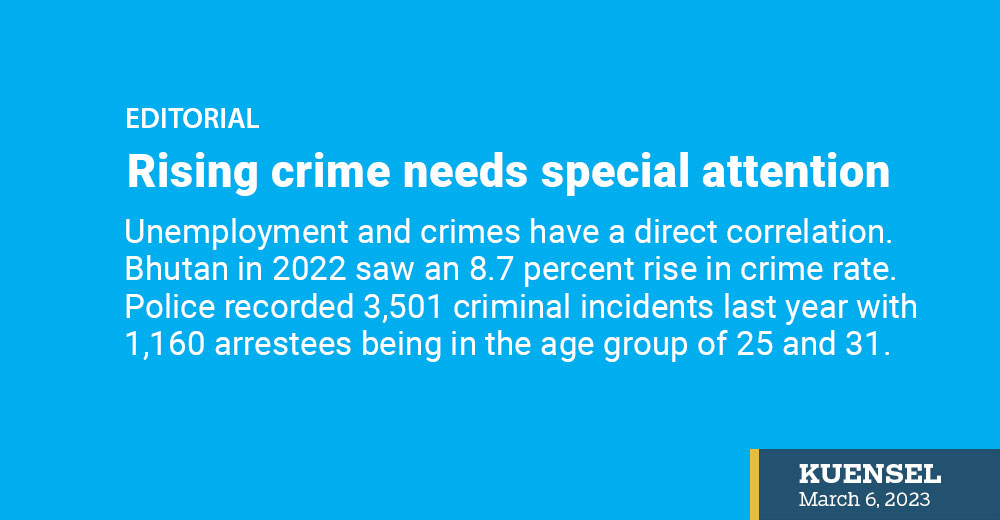Unemployment and crimes have a direct correlation. Bhutan in 2022 saw an 8.7 percent rise in crime rate.
Police recorded 3,501 criminal incidents last year with 1,160 arrestees being in the age group of 25 and 31. The frustration among the people is showing; when people of working age do not find meaningful employment, such eventualities are only to be expected.
Thimphu recorded the highest crime numbers (1,462 cases) in 2022, followed by Chhukha (305), Paro (262), and Sarpang (238). It is the bigger population centres that are experiencing a rise in the number of crimes.
The police dealt with 778 battery cases, 593 substance abuse cases, 505 physical abuse cases, 308 larceny cases, and 251 burglary cases in 2022. Going by some available statistics, at least two youths come into conflict with the law every day. Drug trafficking, battery, alcohol abuse and larceny, among others, are among the crimes that our people are engaged in most of the time.
The increase in crime rate requires immediate attention, said Deputy Chief of Police, Passang Dorji. “Strict implementation of laws is a primary measure to curb this. If our patrolling teams encounter a group of people during night hours, we check them and advise them to be cautious.”
Looks like the stricter implementation of laws needs beefing up. If we continue to leave the safety of the people and the communities to “individual responsibility”, nothing remarkable can be achieved in addressing the rising crime rate in the country.
The Royal Bhutan Police recently launched a massive campaign to sensitise and create awareness on youth-related issues. The stakeholders were asked to strengthen their efforts to curb youth-related issues in the country. We were told that police would conduct awareness campaigns more systematically with new strategies based on the issues that the youth are facing.
Addressing the issue of rising crime cannot be left entirely to the police to deal with. Only linking the stakeholders and coordinated approach can bring any difference at all.
In an earlier interview, Passang Dorji said: “These issues cannot be taken upon by an individual agency or person. It is an issue that should be taken up by stakeholders together and try to see what we can do for the youth to make them responsible citizens of tomorrow. If we can work in a coordinated way, I am sure we will be able to address youth-related issues in the country.”
Parents, more than anyone, can make a huge difference. If we do not make an effort to understand our children, children will resort to things that will ultimately harm themselves and others along the way.


